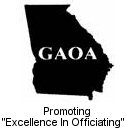"Conflict of Interest (COI)"
"Something is Definitely WRONG? "
"Something is Definitely WRONG? "
A conflict of interest (COI) occurs when an individual or organization is involved in multiple interests, one of which could possibly corrupt the motivation for an act in the other. Every local association should have in its bylaws a conflict of interest (COI) policy, along with an open meeting and open records.
One thing is sure: if you are president of an officials association you had better have a conflicts of interest policy. In fact, if you are an approved state high school association, a booking agent/assignor, or any entity that assigns officials you had better have a conflicts of interest policy. Also, have a written and signed Independent Contractor Agreement between the association/divisions and the member official. One copy is filed with the secretary and a copy is provided to the official. The agreement is good for one calendar year.
NOTE: A new Independent Contractor Agreement form should be signed and dated per calendar year or fiscal year. No onetime for all!! A form should be included for understanding of the GHSA Code of Ethics and Conduct Standards. Both should not be taken for granted by an official. Some officials have lost their administrative ethics long ago.
Self-Policing
Self-policing of any group, organization, or association is a "conflict of interest". If any organization, such as a corporation or government bureaucracy, is asked to eliminate unethical behavior within their own group, it may be in their interest in the short run to eliminate the appearance of unethical behavior, rather than the behavior itself, by keeping any ethical breaches hidden, instead of exposing and correcting them. An exception occurs when the ethical breach is already known by the public. In that case, it could be in the group's interest to end the ethical problem to which the public has knowledge, but keep remaining breaches hidden. Note: Taken from Wikipedia
Conflict of Interest Policy - Courtesy of the IRS
"Charitable organizations are frequently subject to intense public scrutiny, especially where they appear to have inappropriately benefited their officers, directors, or trustees. The IRS also has an oversight role with respect to charitable organizations. An important part of this oversight is providing organizations with strategies that will help avoid the appearance or actuality of private benefit to individuals who are in a position of substantial authority. The recommended conflict of interest policy is a strategy we encourage organizations to adopt as a means to establish procedures that will offer protection against charges of impropriety involving officers, directors, or trustees.
A conflict of interest occurs where individual's obligation to further the organization's charitable purposes is at odds with their own financial interests. For example, a conflict of interest would occur where an officer, director, or trustee votes on a contract between the organization and a business that is owned by the officer, director or trustee. Conflicts of interest frequently arise when setting compensation or benefits for officers, directors, or trustees. A conflict of interest policy is intended to help ensure that when actual or potential conflicts of interest arise, the organization has a process in place under which the affected individual will advise the governing body about all the relevant facts concerning the situation. A conflict of interest policy is also intended to establish procedures under which individuals who have a conflict of interest will be excused from voting on such matters.
Apart from any appearance of impropriety, organizations will lose their tax-exempt status unless they operate in a manner consistent with their charitable purposes. Serving private interests more than insubstantially is inconsistent with accomplishing charitable purposes. For example, paying an individual who is in a position of substantial authority excessive compensation serves a private interest. Providing facilities, goods, or services to an individual who is in a position of substantial authority also serves a private interest unless the benefits are part of a reasonable compensation arrangement or they are available to the public on equal terms and conditions." IRS.gov
Charitable equals 501(c)(3) or (4) tax exempt or unincorporated with tax exemption.
Download a pdf copy of IRS Sample Conflict of Interest Policy
PART II
Two keys to discharging conflict of interest.
A. There are two keys to discharging conflicts of interest:
1. Conflicts of interest must be disclosed to the organization.
2. After disclosure is made, the insider with a conflicting interest must not participate in judging the merits of that interest.
B. When these two things are done, the conflict of interest has been discharged.
Two keys to discharging conflict of interest.
A. There are two keys to discharging conflicts of interest:
1. Conflicts of interest must be disclosed to the organization.
2. After disclosure is made, the insider with a conflicting interest must not participate in judging the merits of that interest.
B. When these two things are done, the conflict of interest has been discharged.



